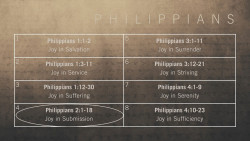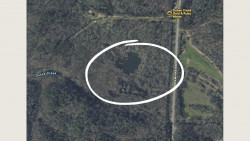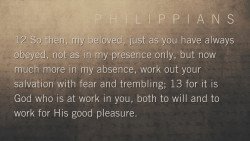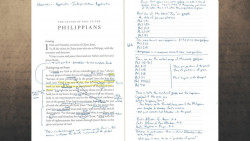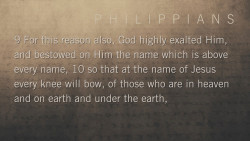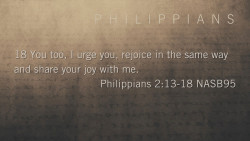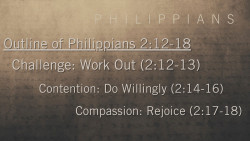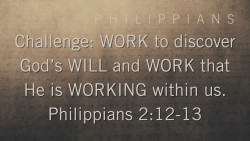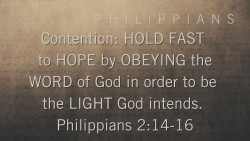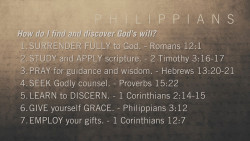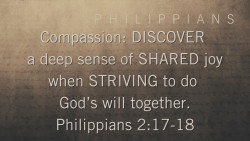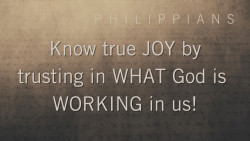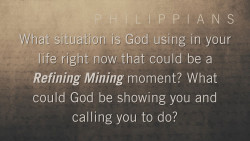Philippians - Part 6
Sunday message.
God's goodness is ever-present, even in our darkest moments. In part six of the Philippians series, pastor Jamie uses the parable of the hidden treasure, to illustrate that while we seek fulfillment in life, true abundance comes from diligently pursuing God's will and recognizing the value of salvation in our lives.
MP3 Audio
MP3 Transcript
View an A.I. generated full transcript of the audio.
Maybe some of us need to be reminded that's not the boogeyman catching us. That's God's goodness. Sometimes we spend a lot of time running from God. Are you listening? Sometimes we spend a lot of time running for God.
And it's God's goodness that's trying to catch us. So maybe today, right now, we could just take a moment. Just close your eyes. Just close your eyes.
Sitting quiet.
How many of you today can say, God's been faithful? Now, wait a minute. Some of you right now, you're going through some dark stuff. But that doesn't mean that God's not right there beside you. He's good.
I mean, he's real good. Father, I don't know the needs of the people in this room this morning, but you do. You know every hair on our head, you number them something we can't even fathom. But, Lord, today, for just the next few moments, Lord, can we just sit like Mary sat at the feet of Jesus? Just let us sit and bask in your love and your presence, Lord, Whatever need we bring to you right now, we ask that we can surrender it to you, God.
Because sometimes the longer we hold onto it and try to fix it, Lord, it's just a statement that we don't trust that you can do it, Lord. We're going to say it right now, together. We trust you. Whatever the outcome, whatever it is, God, we trust you. In Jesus name, amen.
I'm so excited this morning just to think back at what we did Friday night and the faces and the families that we were able to meet and to see. One of the things I think that blessed my heart the most was this year compared to last year. Toccoa First Baptist has partnered with us the last two years, and this year we asked them, hey, why don't you just bring the respite meal here? So what that means is usually they would drop their friend off and those families would go and just have a time to just sit, relax and have a meal. But we realized, hey, they actually want to see.
They want to see what their kid is doing. And it was phenomenal. Some of the conversations to hear as we got to engage with those families and talk to them. I met one family that I was talking with and they haven't been in the area that long. Guys, there it is, helping others connect.
And so it was just a phenomenal. Our teams did great, our leadership did great, and I know I'll get myself in trouble if I start naming names because as Kevin said, there was 400 of them. But I'm extremely thankful this morning for Brett and his team and the church coming and partnering with us. So if you. If you have friends over at First Baptist Dakota, would you tell them thank you when you see them, just say, hey, man, I'm so glad that we were able to work on this project together.
It means a lot. And I believe that Night to Shine has the potential of being a catalyst, not in our church, but in our community. And that's what this is about. So take your Bible, turn to Philippians chapter two. My message is only an hour and a half today.
What y'all think I'm kidding? I'm just kidding. I am kidding. Jesus tells a parable in Matthew 13:44. It's only one verse, but it's chock full of nuggets.
And when I do Bible study, and those of you that's been following along in this study guide and looking at the book of Philippians, when I'm reading the Bible and I'm studying, I'm looking for nuggets. I'm just looking for these little bitty. Just things that jump out and stand out. But listen. Listen to what Jesus wrote in Matthew 13:44.
The kingdom of heaven is like a treasure.
It's like a treasure. It's hidden in the field, which a man found, and he hid it again. And over joy, say joy. Over joy, he went and sells everything that he has so that he could by the field. I got an image I want you to see.
And some of you may not recognize this because I spent the majority of my life in White county, but this is an aerial shot. Some of you will recognize this, especially my friends in the room that grew up in White County. This is the stretch of road on Highway 75 Driving from Cleveland to Helen. And you may recognize up here in the top right hand corner, it says Dukes Creek, Gold and Ruby Vines. Because right below that, if you see where the tree line is, it's what we call Duke's Creek.
And for years, I commuted this road every day. And I would look off into the wood and I would notice these bodies of water. Now, this is just me. I'm just like, why are those things there? If you notice where I circled, there's like a huge pond there.
What is that? If you look over to the right. In fact, Sam and I were talking about this morning because he surveyed this land before you could see other very pronounced, just pits of water. And I'm like, what in the world is that? Is this like Gopher field or Something, I didn't know what it was until one day I noticed after moving to White county, there's a historical marker down in the bottom right hand corner where the road and Dukes Creek meets, and it says, the discovery of gold.
How many of you knew that? You probably thought it was Lumpkin county, didn't you? Why did you think it was Lumpkin County? Because of Dahlonega. In fact, do you know that the word Dahlonega comes from a Cherokee word that means yellow or gold?
See, I learned something today. Didn't even know you were going to learn it. See, just a mile south of where Duke's Creek was, I found a nugget. Her name is Laura Smith, was Laura Thomas back then, but yeah, literally. Her mom and dad's house is a mile from where gold was supposedly discovered.
It's crazy to me that you drive out there and there's a lot of different stories about how that gold was discovered. One story has, there was a hunter walking through deer trail, and he found this three, this little three gram or whatever nugget of gold. Another one had, this man and his servant was walking down through there kind of prospecting the land. But what it did was it incited this huge movement of people coming into the late 1820s, the Georgia Gold rush. And they came wanting to strike it rich to make their life better.
Is that not why we. We go looking for nuggets? How many of you are like me when you were a kid knowing, like, you know, I grew up going to the Dahlonega gold rush days, and I'd be like in my backyard kind of walking around like knocking rocks over, going, well, maybe there's a nugget there. Or like kind of I'd be playing in the sandbox and imagining, lord, if I dig just a little deeper, I might find a gold nugget. Or I'd be in the creek trying to find crawdads and like turning rocks and go, oh, look at that.
And you'd find those fake gold. You find the fake gold, go, oh, mom, look, I found some gold. Why? Because you would like, I would love to strike it rich. I mean, why do you think people race, run down to the raceway and other places to get a scratch off?
It's the same deal. You're trying to strike it rich. Why? So that your life can be better. That's why you do that.
But going back to this, do you know why those pits are there? It's on that plaque at the very bottom. It reads, the pits visible along the creek are evidence of hydraulic mining. At one time, it was estimated that Dahlonega serviced 15,000 miners. That was until the 1830s and into the 1840s.
And gold was discovered in California. And I can't remember if it was the mayor or who it was in Dahlonega, he stepped out on the courthouse steps in front of all these miners, begging them not to go. Luca, I need you to stay here. There is still veins of gold. There's still nuggets out there.
You just got to keep on digging. But the majority of them left. And after California had been milked of its gold, or they got there and there was just not enough spots, they came back and they brought this process called hydraulic mining, which is cheating. They would. If you even go near Duke's Creek, you'll see where they.
They funneled these channels of water. And they basically created the first pressure washer. And they would stand in the side of these hills, pressure washing the dirt away to make it into silt so that they could then go down and strain it again. What were they looking for, that nugget and that gold? All of us are looking to strike it rich, to make our lives better.
But, you know, if you're like me, you realize that some things don't come without hard work. Jesus said, if a man found a jewel, a nugget in a field that wasn't his own, the logical thing was to buy the land. What always confused me about that parable is, why didn't God just put it in his pocket and keep on walking? You ever thought of that? Or have you thought of that?
Like, why didn't he found the nugget? Why didn't he just put it in his pocket or his bag and just keep on stepping? He didn't. He buried it, and he went and bought the land. Why?
Because he knew that there were other nuggets in the land. He wasn't just after the one thing, but the other things that might be discovered. As he kept digging and he kept digging, and he kept digging. Guys, can I tell you? There's something inside of you that's more valuable than the largest nugget that's ever been discovered.
There's something inside of you that if you know Jesus Christ, there's more precious than gold. He's called eternal life. Romans 6:23 says that the wages of sin is what? Death. But the gift of God is eternal life.
I mean, some of you, on Christmas morning, you let loose your pack of wolves, called your kids, and like ravenous wolves, they begin to tear into those Wrappings and those papers and those. Those boxes. Why? Because they knew that what was inside that box was treasure. Guys, have you ever realized that what God deposited in you, he didn't put inside of you just to keep it to yourself, hide it under a bushel?
No. He wanted you to let it out. He wanted you not just to say, like, I have eternal life and I'll go to heaven, but he wants you to experience the abundant Life. Now, John 10:10 says that the thief comes to do what? To steal?
To kill and destroy. But what did Jesus say? He said, I came that you might have life and have it more abundantly. Each one of you have been created with a purpose in God and in Christ Jesus. He has a plan and a purpose for you and for you to experience the full fullness of life.
You got to dig it out. You got to mine it out. In fact, you and I go through phases in our life that I want to call refining, mining moments. It could be some tragedy or something bad where you're stuck somewhere and you're having to go, I got to figure this out. I got to dig a little deeper.
When Laura's mother died, remember? I think I've shared this with you before. This is an example of digging deep and mining something out. She wanted to know, for years she's been in church, but she said, where is my mom? Where is she?
Like, where is she? She's not here with me now, but where is she? And she began to dig into the beauty and the splendor of heaven. She began to dig and read and. And we processed the Book of Heaven by Randy Alcorn and some other things by Chip Ingram.
She wanted to know, what's my mom doing? Does my mom know anything? Where is she exactly right this moment? And that refining, mining moment, she learned so much. And most of you in this room, you're either in a moment right now that God can use for you to dig out from that deep well, that deep mind what God's already put inside of you.
From that, remember, we define joy as grace recognized. You have the supply. Now it's up to us to get the ax and to get a painting, a gold pan. And we need to start sifting and finding what it is that God has worked into our life. So I want to invite you to stand with me because this passage speaks exactly to this.
And I'm going to go a little faster. Last. Last time, I think I preached it twice, so I'm going to read through it. No rabbit trails. Okay?
I got my shotgun I'm going to shoot the rabbits. They're dead right now. Alright, here we go. So then, my beloved, verse number 12. Just as you have always obeyed, not only in my presence, but now much more in my absence, work out your salvation with fear and trembling.
Notice he did not say work for your salvation. He said work. What does it say? Work. This isn't you earning your salvation.
That's not what this passage means. He says, for it is God who is at work in you. Circle it, underline it, bold it, highlight it. It is God who is at work in you, both to will and to work for his good pleasure. Now what does that look like?
This is what it doesn't look like. Do everything, all things, without grumbling and complaining. And every parent in this room said so that. Why? Why is it he's saying that?
So that you will prove yourselves or become to be blameless and innocent. Sanctified. Sanctification, the work of God inside of your life as you are walking and following him, to get the world out of you so that you will. So you'll be children of God above reproach, in the midst of a crooked and perverse generation among whom you appear as lights in the world. In fact, I defined it like this.
You are lit like a light. That's literally what it's saying. Not drunk. Don't think about that kind of lit. You are lit like a light.
You didn't turn the switch on. He did. And so he says in verse at the end of that, so in the day of Christ, I, Paul would have reason to glory because I did not run in vain or toil in vain. But even if I am being poured out as a drink offering upon the sacrifice and service of your faith, I rejoice, I have joy and I share my joy with all of you. So then he commands them and says, I too urge you, have joy the same way.
See the essence, the ingredients of finding joy. But then he says, and share your joy with me, Father, as we dig into this, help us to find again what you've put inside of us in Jesus name. Amen. So point number one, if you follow along on that study guide, here's the challenge. This is the challenge Paul issued.
Work to discover God's will and work that he's working within us. That's a tongue twister. Let me say it one more time. Listen. Work to discover God's will and work that he is working within us.
So again, as you're reading, there's a whole lot of nuggets. No Pun intended. There's a lot of nuggets in this text. Start with me in 12 again. He says, so then my beloved, which is a term of endearment.
It's in the vocative case. It's like, we got Valentine's Day Friday, right? How many of you guys are ready for Valentine's Day? You get an award, and you get an award, and you get an award. Chocolate's probably going to be out by Wednesday.
He's saying, my loved ones. We got a lady who comes in every Sunday morning, and she has a term of endearment, My precious one. And I think that's what Paul was saying. My precious ones, just as you have always obeyed. Obeyed whom?
Well, what he says after this kind of tells us who he's obeying. I mean, he could say, you're obeying me. I'm an apostle. I've given you some things to do. But at the end of the day, the obedience goes back to whom?
Who's the name above all names that's been highly exalted in the verse just before this one? It's Jesus Christ. But Paul affirms that obedience, and he says, not so much in my presence, but also much more in my absence. Come on, let's be real. When we were in school, some of our favorite days in school was when the substitute came, right?
How much work got on days when the substitute was there.
Even the kids down here going, bosses away. The mice will, that's right. Coach doesn't come to practice. He says, hey, guys, y'all just run through your drills and y'all are done in 30 minutes rather than an hour and a half. Richard Linsky points out, he said, there's always a tendency to relax obedience when the spiritual leader is absent.
So I'm going to give you a little nugget here that's not even in the outline. If you only obey when you're in the presence of other people, then your obedience is nullified. Because if you're really, really truly obeying Christ, then you're obeying to please an audience of one. But if you choose to say, well, you know, when I'm around other Christians, I'm going to act this way. I've got an uncle that cusses like a sailor, and every time I'm around him, he'll cuss and he'll say, oh, I'm sorry, preacher number one, I'm your nephew.
If you're watching, I'm sorry. I'm using you as an illustration today. I'm like, don't apologize to me. If you're convicted over what you're saying, then apologize to him. So he's bragging on him, saying, look, I know the depth of your obedience and that you'll obey even when I'm there.
But then he says, I need you to do this work out. Work out, it's the word we get energy from. But this is passive. This is middle passive voice. What that basically means is this.
Something is working on you, and you're in participation with what's working in you. If somebody is, you know, like if somebody is squeezing you, you're going to adjust your breathing patterns to the squeezing, okay? And so he's saying, work out. So when you hear the word work out without any context, what do you start thinking? I'm going to the gym.
I'm going to lift some weights. Well, why do most people go and work out in the gym? To either look better or to lose weight. Some people say, well, so I can get some energy back. But what about the dude who was in a wreck whose leg has withered?
They go to therapy so they can regain strength. Both of those are working out. You see, God is calling us to come into the mine. A mine if you've ever been in one. They're damp and they're dark and the air is thin and it's dusty and it's dirty.
But he's calling us, just as this word implies, to get in there, to get our acts. And we begin to chop and we begin to break the rock. And sometimes that rock is really, really hard. One of the reasons mining in North Georgia was so hard is that those vein of gold, that vein of gold was also mixed in with veins of quartz. Quartz is hard silicon dioxide.
It's hard. It's a hard. It's not as hard a diamond, but it's hard. And they're chiseling away at this day after day after day after day after day. You.
God, you're boring me. But when you know that the treasure's deep down in there, when you know the value of what's been put inside of yours, Jesus said you'll go sell everything you have to buy that field. Well, if you buy that field and then you never work that field, are you going to find the jewel? He. He says, work out your salvation.
Don't earn it. You're not earning it. God has gifted it to you, that free gift. Now it lives and exists inside of you. And he says to work it out.
How? With fear and with trembling. Now, does that mean you're going around jumping at every shadow, going, oh, gosh, is God going to strike me down? No, that's not what it means. It means respect.
It means that you take serious the treasure that has been deposited in you. As Jesus began to tell the parable of the talents. Do you remember that parable? One got five, one got two, and one got one. And the one with one went and buried it.
Remember that? And the owner comes back and says, dude, if you didn't just put it in the bank, it would at least draw some interest. You see, God doesn't want what's inside of you just to be stuck down inside of you. God doesn't want you when hard times come to just stand there going, God, would you please get me out of this? I can't take this pressure no more.
It may be that God's challenging you to get the ax and to start chopping and start chopping and sifting and chopping and sifting so that you can discover something beautiful and something glorious in the life that he has deposited in you. And if you're not living that abundant life, if you're not living that life that God has called you to live, it could be that you've allowed your heart to become so hard that the ax is no longer effective. You need to come back to that place where he says, you are in fear and trembling. Well, why? Why doesn't that matter?
Because it's God who is at work in you. You're working it out, but he's working it in. You're working it out, and he's working it in. He is the energy drink that you buy to get your workout. You know, you want to get a couple of extra reps so you.
I don't know what you guys drink because I don't do any of that stuff. But, you know, you got these shakes and these different things. You're like, oh, I'm gonna get in there. I'm gonna be able to get that extra set. I'm get that extra rep.
I'm gonna get that. That max on that squat or that press.
You and I cannot. Were never intended to live the Christian life void and separated from the God who saved you. That what's working out of you should be a reflection of what has worked in you. So what does it say that he does? He says it causes you to will.
In other words, to want to and to work. It gives you the direction and the ability to do that. What God is working in you is giving you what you need to want to do it. And how to do it. But.
But what's the qualifier for his good pleasure? Sometimes in our life we come into these moments where what we're doing and we're working, we're doing, we're working, we're holding on, we're holding on fast. And we don't really see a purpose and a meaning. But maybe it's just that God says, listen, I need you to hold on just a little bit longer. Dig a little bit more, sift a little bit more.
Don't come out of that mind just yet. Stay in there just a little bit longer. Or maybe shift over here and dig over here for a little bit. But look and watch what God can begin to produce out of you when we embrace these remining, finding, refining moments. So let me ask you a question.
Have you considered the value of salvation?
Have you considered the value of what it is that God has deposited in you? And if so, would you do whatever it takes to mine out of you? What it is that God is working in you so that you can become all that God intends for you to become? Because let me throw another nuance into this. The pronouns in this paragraph are plain plural.
You see, we're all very selfish people. And when we approach scripture, a lot of times we don't read it in the sense that is intended. We try to read it focused around us. Listen what he said. So then you all, just as you all have obeyed not only in my presence, but in my absence, you all work out your salvation with fear, trembling, because it's God who is at work in you all.
Here's my mind. I'm digging, I'm digging. But I also know that next to me is somebody else who's digging and somebody over here next to me who's digging and somebody else over here who's digging. And sometimes I look up as I'm digging and I see so and so, and they're just laid out on the ground because they're tired of digging and they need somebody to come along and pick them up by the arms and say, hey, let me help you dig for a little while. We are in this together.
That's why Paul said at the beginning of this chapter, he said, don't look only to your own interest, but also the interest of others to adapt this humility of mind to be like minded who had the ultimate example, but Jesus himself, who emptied himself by coming down from glory to put on a human body just like you and me to experience the same struggles just like you and me to experience hardships like you and me, to get sick just like you and me. Jesus experienced all those things, never sinned, died on a cross, raised again, glorified by God. Now he wants that power working in you and me. That's what he wants. And when it says to will and to work, not only is it that our minds need to be like Christ, we should want to want the things that Jesus wants.
Do you? Do you want to want the things Jesus wants? Because here's the thing. There's this contrast or contention we must point to hold fast by hope, by obeying the word of God in order to be the light that God intends. You see God, if God's at work in us, then how should every waking moment of my life be different, knowing that I am walking around like a mind with a treasure buried deep in me?
I'm not walking alone. I'm not walking with. My pockets may be empty, but my heart can be full. What he's calling us to do is to work that out. But here's that verse 14, do all things without grumbling or disputing.
Remember in chapter four, he's going to get on to two ladies because they're arguing. We know in chapter one who were preaching. Probably not what Paul would preach, but they were using their words in a destructive way. The word grumbling, really, the word's kind of hard to say even in Greek, but it's gungusimas.
You know, there's words we use like murmur. What does murmur sound like? You know, the word actually sounds like the action you're doing. Well, that's what this means. They're grumbling.
They're, come on, parents. You know, you go in there and say, hey, kids, I need you to clean up your room before you get on the Xbox.
I mean, you get all of these words that come. That is grumbling. But what is the complaining they're disputing? That literally has at its root the use of words to negate something. It's expressing a lack of.
Of faith. In First Corinthians, Paul is referencing this in 1010 when he says nor grumble. He's used three examples from the Old Testament, the wandering of Israel. He says nor grumble, as some of them did, and then they were destroyed by the destroyer. What's he referencing to?
Well, he's referencing this situation when there was a man named Korah and they decided to rebel against Moses leadership. They're in the wilderness. They're sick and tired of it. They're sick and tired of manna. They're sick and tired of walking.
They want to go back and eat melons and be slaves again. And so they're grumbling and they're speaking against the promises of God. And so the earth basically swallows up Korah and his hoard. Well, the next day you think the Israelites learned, but they didn't. The next day they come out and guess what they were doing again?
They were grumbling and complaining against Moses and therefore against God. And God allows a plague to come through and wipes them out, destroyed by the destroyer.
You know, when people look at our lives, especially in a church context, with grace, we're looking at each other as we're digging.
And you want to be an encouragement. You want to dig well, right? You want to keep digging. You don't want to give up. You don't want to be a discouragement to the person in the pit next to you.
Or you may go over to the pit over here and go, hey, you down there. I can't see you. Yes, I'm fine.
What good does it do for me to look at the other guy and say, man, you ain't dug a lot.
Do you even know how to use that axe?
I mean, you know, this is a pan, and you sift the dirt.
One author said it like this, that the grumbling and the complaining, yes, it may have affected the people to their sides, but it was really a statement back to God. When you and I get to that place where we're grumbling and playing and consistently against God, how can we trust God to give me comfort and peace to get through whatever it is I'm going through? When you're constantly shaking your fist at heaven, it may be cutting you off from God being able to work in you what he's trying to work in you. Yes, God. God wears big boy pants, and he can take whatever complaint you bring to him.
He says to bring your cares and cast them on him. Maybe you need to say, God, I just can't pick up the axe anymore. I need you to help me, God. My pit is getting too deep. But maybe God says, look, you've dug there too long.
Come over here. I need you to dig here for a little while. Or maybe, maybe he raises up somebody to come alongside of you to help pick up that. I mean, Aaron and Hur had to stand beside Moses and keep his arms up so the Israelites could win the battle. Maybe you need an Aaron and a Hur in your life because you're tired of digging, but God wants you to dig just a little bit more so that you can discover what it is about that life that he has yet to reveal to you.
He says to do this so you become blameless or separate from the world above reproach in the midst of a crooked. This word crooked is the word we get scoliosis from. Like when you have, if you have scoliosis or you know someone who's had scoliosis, you can't stand upright the way you should. It limits your flexibility, it limits your health. But also when it talked about perverse generation, then that is when you're literally taking and turning off the path, going some other way.
So you, in contrast, if you are living in fear and trembling, working out your salvation, you're not living according to a wicked and a perverse generation. Guys, sometimes you're going to have to draw the line with the people that you're around and say, I cannot participate in this.
Let me say it another way. Sometimes you need to say no. And if they leave you and they're not your friend anymore, it's completely okay because God is calling you to come out. Peter in fact preached in Acts where he said to be saved from this perverse generation and we need to hold on that what salvation that he's working in you and me. Why?
Why does he want to do that? Well, just like Jesus said, let your light shine before. He is working in us to become lights in the world. Lights how? Showing them that we want to do what God wants us to do and that we are doing what God wants us to do.
No one's perfect. No one's going to do it perfect. But like a light, like if I. If you buy light bulbs, you can. You used to be able to buy 40 watt, 60 watt, 100 watt.
Now they're all LEDs and you can do a whole lot of things with them. We may be shining a little bit different, but the light is on because Jesus is in you. That word again. It literally means he's turned the switch on. It's passive.
Or he's working on you and me to be the light. Well, why was he wanting you to be a light? So that you can be a voice of hope, separate from this world system and living for the glory of God. How do I do that? Verse 16.
You hold fast the word of life and he has again the judgment in mind so that in the day of Christ he said, I will have reason because I didn't run in vain or toil in vain. If you think about mining crew, if the foreman of the mining crew comes and all the miners are laying outside the mine, just kind of laid back, leaning against their pickaxe. The miner, the mining foreman probably would get upset, wouldn't he? Dude, I hired you to mine. Go mine.
I've told you to mine. If any spiritual leader comes into a room where they're pouring their guts out to a congregation, wherever it is, we want it to do it in such a way that it inspires you to keep on digging, to keep on going. Why? So that when we stand before the Lord and say, God, I did everything I could do to help motivate people to keep on digging, to keep on discovering that abundant life, to keep on pressing in. And Paul is saying the same thing.
Because if he wants them to stand blameless before the Lord, someday he wants to stand there himself blameless. So we want to do the will of God for time's sake. On your study guide, let me give you eight things very quickly. I thought to myself when I got to this place in the message, like, when was the last time I heard somebody say, how do I know how to do the will of God? And you may have other things.
You say, oh, it ought to have this in the list. Okay, this is not intended to be exhaustive, but for some of you in this room, young to the faith, maybe somebody needs to instruct you. This is how you discover the will of God. Remember, he's working in us, the motivation and the work. Like we want to do this.
So number one, surrender fully to God. You're not going to want to do what God wants you to do if you don't care about to whom it is you're doing it. You obey Christ, you're obeying God, not yourself. Not to make yourself look better. Some of the strongest Christians that I've known that fell away like they were.
I knew this one student, she was in high school, she was in fca. She did everything, everything, everything. But she was doing it for her own self glory. And when she graduated, her faith was gone. Are you doing it for the Lord?
Number two, study and apply scripture. Study and apply scripture. I mean, God's not going to tell you to do something that's contrary to his word. Did you catch that? You're not going to dream up some wild crazy idea that's contrary to what the word says.
If the word says do this, do this. If he says don't do this, don't do this, he's not going to speak to you. A separate word that doesn't align with revealed scripture. Number three, pray. I mean, that should be common sense.
But In Hebrews chapter 13, at the end of his letter, the writer of Hebrews said, this equip you. He's praying this equip you in every good thing to do his will. Number four, seek godly counsel. You need strong, faith filled, humble Christians around you to guide you, right? When you surround yourself with fake Christians or Christians who are not committed, they're going to guide you.
Wrong. You need godly counsel. Number five, you need to learn to discern. Learn to discern. It is a skill.
You're testing the spirits to try to find out what it is that God wants for you to do. Remember Charles Stanley saying when they were in a building campaign that he missed it? I'm like going, dude, Charles Stanley, Charles Stanley doesn't miss it. But he said he missed it. But he was humble enough and big enough to say, you know what?
I missed it. But he didn't stop digging, did he? I mean, to the day he left this world, he stayed faithful to what God called him to do and to do his will. But we've got to learn how to do that. Number six, give yourself grace.
If there's nothing else in here that I want you to hear, I want you to hear this one. Sometimes people will try hard and then they give up. And then they'll try hard again and they'll give up. God needs you to be faithful and consistent across the board. That's what he's calling you to do.
He will equip you to do it and he'll empower you to do it. But when you mess up, ask for forgiveness. Get back on your feet and keep on stepping. Keep on digging. 7.
Employ your gifts. God gave you a spiritual gift. Use it. If you want to do God's will, do the will that he equipped you to do and then last, trust God for the results. And this is the one where we are uncomfortable because we don't like to let our hands go.
We want to make it happen because our flesh loves glory, we love attention, we love the accolades, we love to be in the spotlight. But when we're doing it for the Lord, if we're submitted to him, then I need to trust that God's going to make it happen again. Verse 13. For it's God who is at work in you. The results never and have never depended on you and me.
I thought the other day about this. God didn't have to tell Noah to build a boat. You know that, right? He could have saved all that drama of Drunk dads and all that stuff. In that story, he could have wiped out all of humanity and all of animals and just spoke them right back into existence.
But he chose Noah and his family to be ambassadors of his. What about you? God's called you and me to do that and called us to do it together so that last point that we could discover a deep sense of shared joy when we strive to do God's will together. Listen to the beautiful words he says. He says, excuse me, for if I'm being poured out as a drink offering upon the sacrifice and service of your faith.
That's a weird statement, but it makes sense if you know how sacrifices work. In numbers, chapter 15, the prescription is giving that when you bring a burnt offering which is to be fully consumed, that the last thing done was there was a cup of wine, a libation that was poured out on that altar. A sweet aroma. It was the last thing done. Paul is saying, you've made your sacrifice, Philippians.
I'm the drink offering. So he says, if I'm being poured out as a drink offering, the only way that's happening is if I've done what I'm supposed to do to help you be the best that you could do. So as you're laying down your life, you are that burnt offering. You are that sacrifice. I'm right there, right along with you.
But I'm being poured out. Maybe he had in his mind, again, I'm about to die. But he uses this same word when he talks to Timothy in second Timothy, chapter four. He says, for I am already being poured out as a drink offering, and the time of my departure has come. And he says, but I have fought the good fight.
I have finished the course and I have kept the faith. And for me there is laid up a crown of righteousness which the Lord himself, the righteous judge, will award on me that day, but not only to me, but to all who love his appearing on the day of Jesus in the day of Christ. Can we stand there holy and blameless, not grumbling, not complaining, but in fear and trembling, knowing that we strove to allow God to work through us what he was working us. He says, rejoice with me, then have joy. And he says, and then you need to have joy.
How can somebody tell you to be happy? Like if I look at you right now and say, be happy. You know what he did? He went, yeah, I'm happy. Look at me.
Oh, thank you. Thank you very much. I mean, you know, that's like, nobody can force you to love Somebody, nobody can force you to have joy. But remember we talked about, joy is not, not the emotion, it can be the emotion, but it's realizing and recognizing the grace that God's working in you. Maybe, maybe the key to joy is I'm here and I'm digging and I'm digging and there's this nugget down there, and I'm not going to give up.
When you know, when you see it or you reach down and you strike something hard, you go, oh, man, this may be it. You get down, you take a brush, and you're starting to dig around and go, oh, my, this is it. This is it. I found the joy. I found joy in that treasure.
It's mine. It's mine. And that's the eternal life that God's given to you. Mine it out. Recall the goodness of eternal life, not just at some day, but now.
You can experience the eternal part of eternal life. You and I can have joy. That last line, we can have joy, but trusting what God is working in us. So you have these refining, mining moments rather than letting them scare us, rather than being afraid of the dark, rather than being afraid of the work. What would it look like in your life and mine if we just pick up the axe and we start digging?
And if you're tired and you're worn out, it could be that God's got somebody right beside you, you don't even realize it, that wants to help you dig too. We need each other church. You need each other partner together. Because I would. I can't.
I mean, nothing blesses my heart more to see someone when they've accepted Jesus, experience that true joy that only comes from that. So I invite you right now. I want you to stand with me. I'm going to do this altar call just a little bit different. Just today.
Altar is always open. But maybe you're here today and you say, you know what? I'm just exhausted. I'm tired. I can't stand anymore.
God's not revealing himself to me. But can I ask you if you could come today? We've got pastors down here, we've got other people would do this too. But come to us and say, lord, I need you to pray for me. I've been in this situation for a while and I just, I can't find the nugget that I need.
Would you help me? Here's the other part, and this one might be a little bit. You know, you don't have to do it now, you can do it later, but if you do it now. It's okay, too. There's people in this room that just give you life.
They're those encouragers who stand beside you. They're like a Miss Wanda Carpenter who every Sunday morning when she comes in this place, she calls me her precious one. And she's probably called some of you her precious one, too. Do you know how encouraging that is? That's so encouraging.
To know that somebody's there praying for you, walking alongside you. What if during this invitation, you went to that person and said, can I thank you for helping me? I mean, how big of a thing is that? Or maybe you could go to somebody and say, maybe it's not one of us on the front. Maybe you know somebody in this room that's always been there for you, that's been.
Just been a fighter for you, and you just want to go over and say, hey, can I just tell you thank you. Share your joy with them so they can share their joy with you. I mean, I know y'all want to get to lunch. It's 11:30. Do you remember what Jesus said?
My food is to do the will of him who sent me. And that nourishment produces satisfaction. Father, as we come to this time of decision, maybe somebody's lost today. Maybe somebody needs to rededicate their life. Maybe someone needs to be baptized.
Maybe somebody needs to join the church. Those decisions are always in front of us to make. But, Lord, today, maybe somebody just needs to come down here and say, you know what? I'm tired and I can't dig anymore. And let the church come around them and say, no, you're not going to dig alone anymore.
We're here together. But maybe this morning there's somebody here and they just want it. They're just filled with joy right now. They need to go thank somebody, Lord. Let them do that, Lord.
Let them express that joy. Let them encourage somebody else. Sometimes people will come up and say, you know, you encouraged me. And we're like, I didn't know I did that. Maybe somebody here today needs to hear that, because they may be struggling, thinking, am I making a difference?
And to hear the words, yes, you encouraged me is so powerful. So be with us, Lord. This is your time to work in us. In Jesus name, amen.
More from the Philippians Series
- Philippians - Part 1 - Joy in Support ... (January 5, 2025)
- Philippians - Part 2 - Joy in Serving ... (January 12, 2025)
- Philippians - Part 3 - Joy in Suffering ... (January 19, 2025)
- Philippians - Part 4 - Joy in Submission: Unity in Christ ... (January 26, 2025)
- Philippians - Part 5 - Joy in Submission: The Example of Christ ... (February 2, 2025)
- Philippians - Part 7 - Joy in Surrender: Giving Up ... (February 16, 2025)
- Philippians - Part 8 - Rejoice in Pressing On ... (February 23, 2025)
- Philippians - Part 9 - Joy in Surrender: What's to Come ... (March 2, 2025)
- Philippians - Part 10 - Joy in Serenity ... (March 9, 2025)
- Philippians - Part 11 - Joy in Sufficiency ... (March 16, 2025)
Weekly Bulletin


